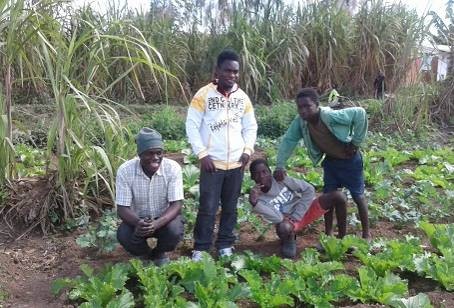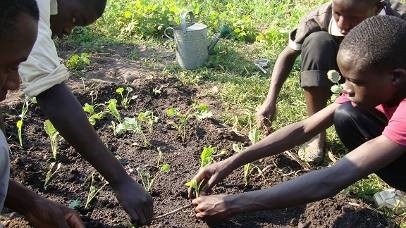Update on Ephraim Chirwa in Malawi
Drought conditions in Kenya and Malawi are worsening. In Kenya, the drought was recently and declared a national disaster by President Kenyatta. Partnering with Buddhist Global Relief, Ecology Action helps provide training in the GROW BIOINTENSIVE system to farmers in Malawi and Kenya through our international partner Grow Biointensive Agricultural Centre of Kenya (G-BIACK). In Malawi, women who are the primary victims of the HIV/AIDS crisis—and more specifically widows—are among the worst affected and most marginalized groups in the country, and often face starvation and poverty. Ephraim and Charity Chirwa, who received their GB training at G-BIACK, primarily teach GB to widows and woman farmers in Malawi. Children of all ages assist their families in the production of food and are a critical part of the farming community, and are included in the training whenever possible. Ephraim says, "Each year millions of people in Malawi face food shortages and potential starvation. The only way to survive is by growing their own crops to provide both their main source of food, but also often their only source of income. Self-sustainability through agriculture is absolutely vital. If the crops fail, the situation becomes extremely dire. With little to no money to buy food, families rely on handouts from charitable organizations or their communities. And if that's not forthcoming they face starvation. The other challenge has been that at the end of the harvest Malawi's farmers typically burn their fields to make way for the next crop. This damages fragile soils and deprives them of organic matter they need to retain water and nutrients. Now farmers are educated not to burn their fields to prepare them for planting. It may have been the accepted practice years ago when there was far more land to go round, but it is no longer a viable farming method." In 2017, Kenya's Red Cross warned that 2.7 million people face starvation due to drought if help was not provided, a situation that continued through the rainy season of 2018... but food aid is only a temporary bandage, not a long-term solution. G-BIACK reports that even in the drought, their Mini-Farm is one of the few properties in the area that is green and producing food successfully. GROW BIOINTENSIVE is one of the few solutions available to the smallholder farmers in Kenya and Malawi that actually helps build food security and climate change resilience at a community level. Once communities learn how to farm using sustainable means, widows, orphans, and families have food, and income from the sale of some of their produce. In July, Ephraim and Charity trained 101 people, including 16 children. The participants learned that while farming is hard work, the resulting rewards are sweet: in a drought, they successfully grew tomatoes, cabbages, Irish potatoes, canola, mustard greens, maize, and onions. This grassroots work helps fight hunger, and is so important. We are so grateful to our partners, donors, and hard-working farmers-leaders for keeping GB growing strong where it is most needed! ♥
Teaching youth in Malawi
top | Newsletter Home |Table of Contents| Archive
|




